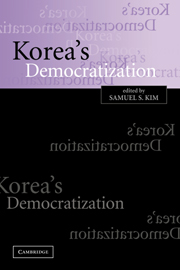Book contents
- Frontmatter
- Contents
- Tables and Figures
- Contributors
- Preface
- Part I A Framework of Analysis
- Part II Consolidation at the Mass Level
- Part III Consolidation at the Civil Society Level
- Part IV Consolidation at the State Level
- 6 Regional Politics and Democratic Consolidation in Korea
- 7 Crafting and Consolidating Constitutional Democracy in Korea
- 8 Security and Democracy in South Korean Development
- 9 The Developmental State and Democratic Consolidation in South Korea
- Bibliography
- Index
6 - Regional Politics and Democratic Consolidation in Korea
Published online by Cambridge University Press: 29 July 2009
- Frontmatter
- Contents
- Tables and Figures
- Contributors
- Preface
- Part I A Framework of Analysis
- Part II Consolidation at the Mass Level
- Part III Consolidation at the Civil Society Level
- Part IV Consolidation at the State Level
- 6 Regional Politics and Democratic Consolidation in Korea
- 7 Crafting and Consolidating Constitutional Democracy in Korea
- 8 Security and Democracy in South Korean Development
- 9 The Developmental State and Democratic Consolidation in South Korea
- Bibliography
- Index
Summary
Introduction
Democratic transitions and their sustainability have become a major theme of the theoretical literature in the social sciences. After the wave of democratic transitions in the 1980s, scholars and policymakers turned their attention to the sustainability and strength of these nascent democratic countries. Scholars have been exploring whether the values and wealth of citizens create preconditions for democracies, examining institutions and strategic choices made by individual voters and politicians, and assessing the role that civil society plays in democratic transitions.
One major analytic issue that has arisen is the extent to which nascent democracies have actually become consolidated. Such a consolidated democracy, it is argued, is one in which democratic values and ideals are stable and deeply institutionalized. As Arend Lijphardt has written, “democratic politics is not merely a ‘superstructure’ that grows out of socio-economic and cultural bases, it has an independent life of its own.” Scholars taking a “maximalist” position consider democracy consolidated when an accountable civilian government guarantees basic civil rights such as expression and assembly, and when society is largely involved in the political process. Those taking a “minimalist” position focus on the existence of free competitive elections with peaceful transfers of power.
South Korea is a notable case of a democratic transition. And although South Korea has made dramatic strides toward true democracy in a number of areas, there is still concern that democracy is not yet consolidated.
- Type
- Chapter
- Information
- Korea's Democratization , pp. 161 - 180Publisher: Cambridge University PressPrint publication year: 2003
- 2
- Cited by



